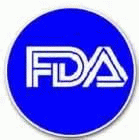/>FDA icon by Food and Drug Administration
FDA icon by Food and Drug Administration
As this piece is being written, there is a little known petition awaiting action at the Food and Drug Administration. The official title is Flavored Milk; Petition to Amend the Standard of Identity for Milk and 17 Additional Dairy Products. It is in the public comment period until May 21, 2013.
This is a time when the the public has an opportunity to materially affect how they, the consumers, may protect their own health and that of their offspring for generations to come. In that respect the timer is running down and anyone who consumes milk might want to see what the milk producers have planned. The other dairy products on the hit list include acidified milk, cultured milk, sweetened condensed milk, nonfat dry milk, nonfat dry milk fortified with vitamins A and D, evaporated milk, dry cream, heavy cream, light cream, light whipping cream, sour cream, acidified sour cream, yogurt, low-fat yogurt, and non-fat yogurt.
The Federal Register has the
petition listed on their website where it can be viewed and comments can be
posted:
To summarize the petition, the IDFA and
NMPF (International Dairy Foods Association and the National Milk Producers Federation) have
petitioned the FDA to seek approval to allow optional characterizing flavoring
ingredients used in milk (e.g., chocolate flavoring added to milk) to be sweetened with any safe and suitable sweetener--including
non-nutritive sweeteners such as aspartame. [1]
Without doubt, the petitioners are using childhood obesity as the talking point to sell the idea of using the cheap but toxic aspartame as the sweetener or flavoring in dairy products. While the idea of more healthy eating habits and a reduction in childhood obesity are obviously good ideas, using additional aspartame in the food chain is counter-productive and dangerous. The diets of Americans and their children in particular are already loaded with the substance.
So why should we be concerned? A study was done by the University of Texas Health Science Center at San Antonio that showed adverse health effects to people who consumed aspartame-flavored diet drinks. [2] The study suggested that instead of fighting obesity and its associated hazards, the use of aspartame might actually contribute to the conditions. Honesty and fair dealing would necessarily preclude adding even more aspartame to our diets. Right off, that alone is reason enough to question their motives; however, there is more.
Professor E. Pretorius, P. Humphries, and H. Naudà � reported several disturbing observations concerning aspartame
consumption in the European Journal of Clinical Nutrition.
Perhaps the longest on-going study on the deleterious
effects of aspartame consumption has
been that of Woodrow Monte, PhD, Professor Emeritus of Food Science and
Nutrition at Arizona State University. His 30-year research has established
direct links between aspartame and several diseases, particularly the diseases
of civilization such as heart disease, cancer, multiple sclerosis, and
Alzheimer's. Dr. Monte's studies center on the methanol-formaldehyde toxicity
paradigm with compelling evidence. In his book, While Science Sleeps,
Monte explains how he considers methanol a medical Trojan Horse.
Dr. Monte has also compiled a list of 745 other studies showing that aspartame is indeed a very dangerous substance when consumed by humans. [4]
Numerous other researchers have consistently found damaging
evidence linking aspartame and formaldehyde via the methanol component
of aspartame. Rich Murray has compiled a list of respected studies. [5] One of the studies included in that list by C. Trocho, et al,
reports the following:
Formaldehyde derived from dietary aspartame binds to tissue
components in vivo. It clearly demonstrates cellular persistence and
accumulation, or in layman's terms, that formaldehyde can remain and accumulate
in the body. It is absolutely
established that formaldehyde converted from the methyl ester in aspartame
embalms living tissue and damages DNA. [6]
A small window of opportunity exists for concerned citizens to exercise a degree of self-defense in dietary matters for themselves and for the health of their children; May 21, 2013, is the last day for public comments on the issue of allowing aspartame to be used in a wide range of diary products.
Charles Foerster
is a former Naval Aviator and professional pilot. Email: Email address removed
Originally published at Global Research.
(Note: You can view every article as one long page if you sign up as an Advocate Member, or higher).





